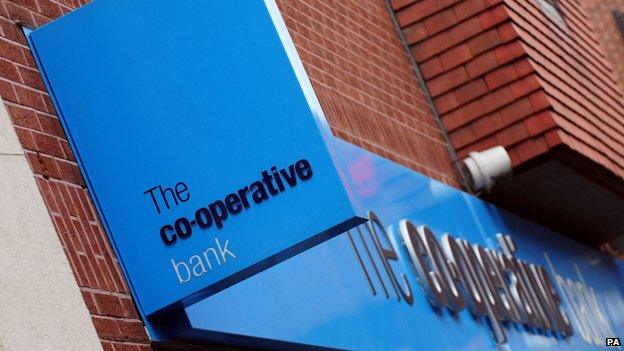Co-op Bank: No room for error
- Published
- comments

The losses were well trailed, but they are still sobering.
First of all, there was an apology to customers for the failings of the past. Then there was the announcement of an ethical review. Then a lot of detail about the chief executive's pay and suggestions that the bank may consider blocking future bonus payments that, frankly, were unlikely to be paid out in any case.
But it isn't until you get into the guts of the Co-op Bank's annual report and accounts that you understand the true challenges facing the organisation. With tissue-thin capital buffers, there is no room for error.
One sentence jumps out. "The year-end Common Equity Tier 1 ratio of 7.2% is below prior guidance."
This is the key test of a bank's capital position and, therefore, security - the amount of money it has readily available to absorb shocks.
It is just above the level at which the Bank of England could force the Co-op into emergency resolution, taking over assets and enforcing losses on investors which include the Co-op Group.
The Co-op Bank says it is confident it can raise the necessary capital to avoid such a situation.
The bank is in a position where it is wholly reliant on its investors stumping up the necessary millions of pounds agreed in the refinancing which saw the Co-op Group's stake fall to 30%.
Co-op Group - itself facing mammoth losses - is still due to make payments of £100m by the end of June and £163m by the end of the year.
And that is before the small matter of the £400m extra fund-raising announced last month that the Co-op still needs to get away.
The cost-income ratio at the bank has also flown upwards, from 73.7% in 2012 to 93.6% in 2013. On average, banks like to see a cost-to-income ratio closer to 50%.
It is clear that the Co-op Bank is becoming increasingly expensive to run, as the balance sheet contracts and the complexity of unravelling previous problems weighs on costs.
Some brutally honest points are made in the accounts. "The bank does not have a track record in successfully executing large scale changes"; the board "needs to be strengthened"; the split from the Co-op Group is proving more costly than previously thought and cost reductions - including redundancies - may not be achieved. Any failure and that tissue-thin capital buffer could be torn through.
The Bank of England will apply its own stress tests to the Co-op in the summer. Given that the Co-op is a bank well used to discovering some pretty unsightly problems when it roots around under the bonnet, it should be prepared for more bad news.
Estimating future poor conduct costs is notoriously difficult, as all the High Street banks found during the payment protection insurance scandal.
There are some small pinpricks of light. Despite the adverse publicity of a former chairman who didn't appear to know basic information about the bank's balance sheet and then was filmed apparently taking drugs, customers have remained remarkably loyal.
The number of current account and business customers are up slightly. Customers still appear to attach a good deal of importance to the bank's "ethical" stance, despite the calamities of the last year.
Niall Booker, the Co-op's chief executive, professes himself confident that UBS can successfully complete the vital £400m fund-raising. Customers of the bank will hope he is right. There is no room for mistakes.